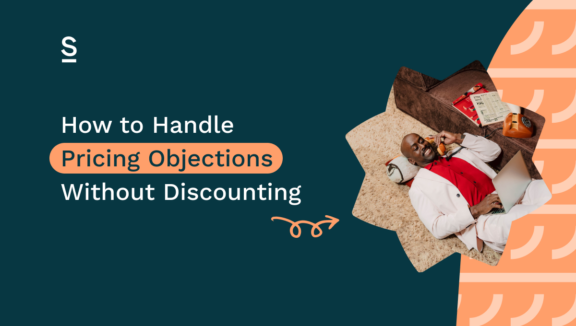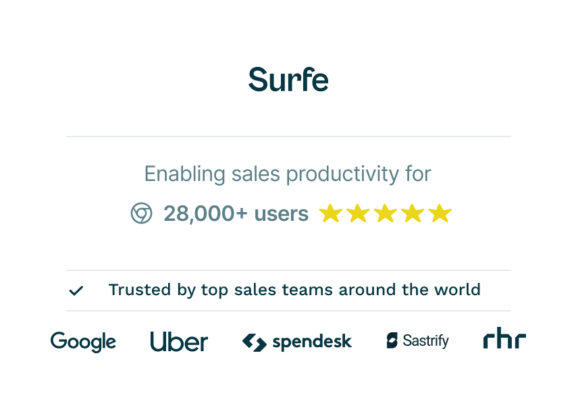How to Handle Pricing Objections Without Discounting

We’ve all been there.
You’re talking to a promising lead. Things are progressing nicely. You can see the finish line, and start thinking about how you’re going to tell your manager you’ve closed – again. You’re so good at your job it’s almost embarrassing.
Then, out of nowhere:
“Sorry, it’s just too expensive…”
Ugh.
Price objections aren’t just annoying – they’re difficult to overcome, too. In fact, 35% of sales reps find handling price objections the most difficult part of their role. It’s little wonder that many sales pros are tempted to offer a discount to close the deal – after all, it’s the easiest way to smooth this situation over.
Unfortunately, just because something is easy doesn’t mean it’s right (we know – who made that rule?!). When used at the wrong time, a discount can erode the value of your product and hurt long-term profitability. In other words, offering one might come back to bite you.
Handling pricing objections effectively without discounting is crucial for maintaining the integrity of your product or service’s value – and this blog post is going to teach you exactly how to do it:
- Why Pricing Objections Happen
- Shifting the Focus from Price to Value
- Reframe the Discussion Around Outcomes
By the end of this article, you’ll be well-equipped with strategies that build trust, address concerns, and add value without cutting prices.
Sounds good? Thought so – let’s get started.
Why Pricing Objections Happen
The most important thing to do when handling any objection is to treat it with empathy. It’s easy to get defensive – particularly when the objection shows up late in the game – but that’s not going to help anyone. Instead, try to understand what your prospect is trying to tell you by objecting.
Sure, maybe they’re just someone who likes to get money off (we’ve all been that person). But maybe they don’t quite understand the value your product’s going to bring. Or maybe they understand the value, but the only way they know how to negotiate is by asking for a discount. Maybe they’re just really scared of their boss and worried about making a bad investment.
It’s also worth getting a little navel-gazey for a second. Be honest: did you qualify the prospect properly? We promise we’re not accusing you of being a bad salesperson – but when you’re working at scale, it’s an easy mistake to make. In fact, 67% of lost sales occur because reps don’t properly qualify customers, which leads to misunderstandings around price.
Perhaps in your heart of hearts you know that this prospect isn’t really a good fit. Maybe they’d be better off going with your cheaper competitor, or maybe they don’t actually need your product at all.
If that’s the case, our work here is done (just call us a miracle worker). If that’s not the case – you genuinely think your prospect needs your product, and don’t quite understand where this has come from – let’s dive into how to turn the conversation around.
Shifting the Focus from Price to Value
If you were paying attention (you were, right?) you’ll now understand that you should try and figure out why your prospect’s objecting to the price.
Asking some targeted questions should do the job. Try something like:
- What aspect of our solution concerns you in terms of cost?
- If pricing wasn’t an issue, would you move forward?
- Do you have a budget?
- Are you trying for a better deal?
Their answer will point you in the right direction.
For example, say you ask them what exactly it is about the pricing that concerns them and they mention they’re talking to a cheaper competitor. You could then come back with some data that shows your product has a stronger ROI, for example.
Focus on the long-term ROI, and you’re encouraging your prospect to think beyond the initial investment.
If you’ve (cough) qualified and nurtured your leads properly, they should be properly bought in by the time it comes to actually talking to you. Companies that excel at lead nurturing generate 50% more sales-ready leads. This should make a conversation about long-term ROI easier to handle.
Use Social Proof and Testimonials
Still need to do a little more persuading? Now’s the time to bring in the big guns: social proof.
If you have a case study or testimonial from a customer who initially had similar concerns, now’s the time to bring it out. If your prospect has social proof – from someone who’s probably in a similar role to them – they’re far more likely to feel confident going ahead. Think about the 6 principles of persuasion: consensus is one of them. Humans like to feel that they’re part of a group.
91% of buyers trust referrals from people they know – and if your prospect can see themselves in the case study, you’re on the money.
If possible, it’s worth mentioning that the star of your case study saw incredible returns – without paying a discount on the product in the first place. In other words, you’re pulling the conversation away from the initial investment and towards the long-term benefits they’ll experience.
Offer Flexible Payment Terms, Not Discounts
OK – what if the prospect’s still not convinced? One way to negotiate without devaluing your product is to propose flexible payment terms. Perhaps your business can offer an installment plan, a subscription model, or extended payment terms to ease the pressure?
Another tip is to reduce what your prospect gets for the price they want to pay. Say they have a budget in mind – perhaps you could remove the ability to use a certain part of your product, or perhaps they’ll get a service from a lower tier. This, of course, does depend on the flexibility of your offering, but it can be a great way to meet your prospect halfway.
Whatever you do, position payment flexibility as a win-win for both parties. You don’t want to look as if you’ll bend over backward for the sale – this just encourages prospects to negotiate even further. Before you know it, you’ll have offered your full product, your office furniture, and the kitchen sink for an absolute bargain.
Instead, show that yes, payment flexibility is a win for them but it’s also convenient for you. They’ll be thrilled and accept your terms, you still get the sale in the big. That really is a win-win.
Reframe the Discussion Around Outcomes
Talking about outcomes is super important when handling pricing objections. As we’ve already covered, financial returns are really important – but what about the outcomes that feed into money saved?
Does your product get rid of hours of admin for your buyer? Perhaps it results in happier staff, or a better service for their own clients? Maybe it improves safety in the workplace?
You get the idea – whatever your outcomes are, make sure to include them in the conversation and hammer. the. emotion. home.
If you’re wondering what on earth we mean, let us explain. Sure, maybe your prospect is just a robot who wants to do less admin so they can move onto other work. But it’s more likely that they want to do less admin because their stress levels are at an all-time high, or they really want to impress their boss and getting rid of admin frees up time to work on a side project or a skill.
Metrics like time saved, revenue increased or risks reduced are super important – but the true magic happens when you attach them to an emotion.
Leverage Scarcity and Urgency (Ethically)
Creating a sense of urgency can sometimes be just the ticket to pushing your sale along. The mere urgency effect means that people are more likely to act on an urgent task – even if it’s not as important as everything else on their plate.
Create this sense of urgency, and you’re encouraging your prospect to act. The longer you leave them to hang around, the more these pricing doubts will creep into – and even take over – their mind.
You can create a sense of urgency with scarcity tactics (scarcity is another principle of persuasion, btw). If there’s a limited amount of a product, the value goes up. If your prospect sees more value, their pricing concerns seem less important in comparison. Clever, right?
Very, very important note: this isn’t an excuse to start using urgency unethically. If there’s not a genuine reason for the prospect to make a decision quickly, just don’t use it. Remember, the decision has to benefit them as well as you. Rushing your prospect to buy when they don’t actually need to will leave a sour taste in their mouth, which isn’t going to do your Customer Success team any favors when they’re managing the relationship.
Let’s Wrap It Up!
By now you should, dare we say it, be kind of…looking forward to your next pricing objection. Crazy, right? Think of every pricing objection as an opportunity to learn, and you’ll 1) help your prospect make the best decision for them and 2) find out something new about the people you’re selling to.
A salesperson that manages to get their prospects on board without devaluing their product is a salesperson who’s going to go far. You heard it here first.

Hey, you know what else is going to make you a really, really successful salesperson?
Hint, it begins with S- and ends with -urfe. Better click the button below to see what it’s all about.
FAQs About Handling Pricing Objections Without Discounting
How To Respond Directly To a Pricing Objection?
If you want to respond directly to a pricing objection, you can ask a question back. Questions such as “What is your budget?” or “Are you trying for a better deal?” are direct ways to find out why the prospect has made this objection, and what you can do to overcome it. For example, if it turns out their budget is smaller than your price, you might be able to suggest an initial reduced service and trust that your Customer Success team will be able to upsell later down the line.
How To Handle Pricing Objections?
The main thing to keep in mind when handling pricing objections is to approach it from a place of empathy. It’s natural to get defensive or to try and move the conversation along quickly by offering a discount – but that’s not going to help you, or your prospect. Instead, try to understand why they’ve made the objection and what you can do to help. Finding a solution that suits both parties is the best foundation for a long-term relationship.
Why Do Prospects Make Pricing Objections?
Prospects may make pricing objections because they like getting money off – simple as that. Or it might be something more complex, like:
- Their budget is smaller than they originally thought
- They don’t understand the value of your product
- Asking is their negotiation style
- They’re worried about making a bad investment
As a salesperson, it should be your priority to find out the reason behind their objection – if you don’t, you’ll struggle to move the conversation forward in a way that suits both of you.
How To Prevent Pricing Objections?
The best way to prevent pricing objections is to nurture and qualify your prospects properly. If you don’t qualify your prospect, there’s no way to know if they actually need – let alone want – your product. They might be far better suited to a competitor, and way out of budget. Finding this out once you’ve already invested time in them isn’t beneficial for you or for them. Nurtured prospects are also far more likely to understand the value of your product. Pricing objections may still come up, of course, but it’s likely to be down to a reason like budget cuts as opposed to a lack of perceived value.


